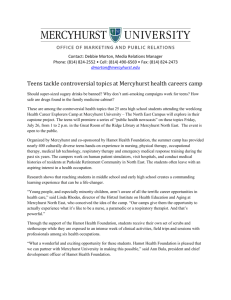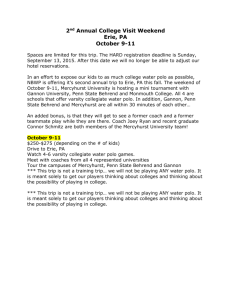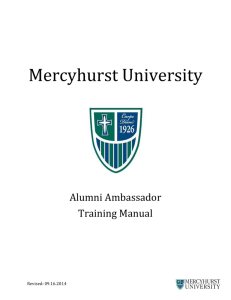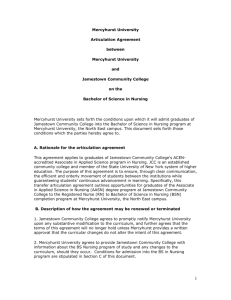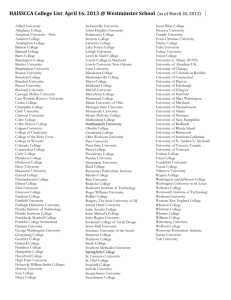Advanced Comp - Final Project (Revised)
advertisement
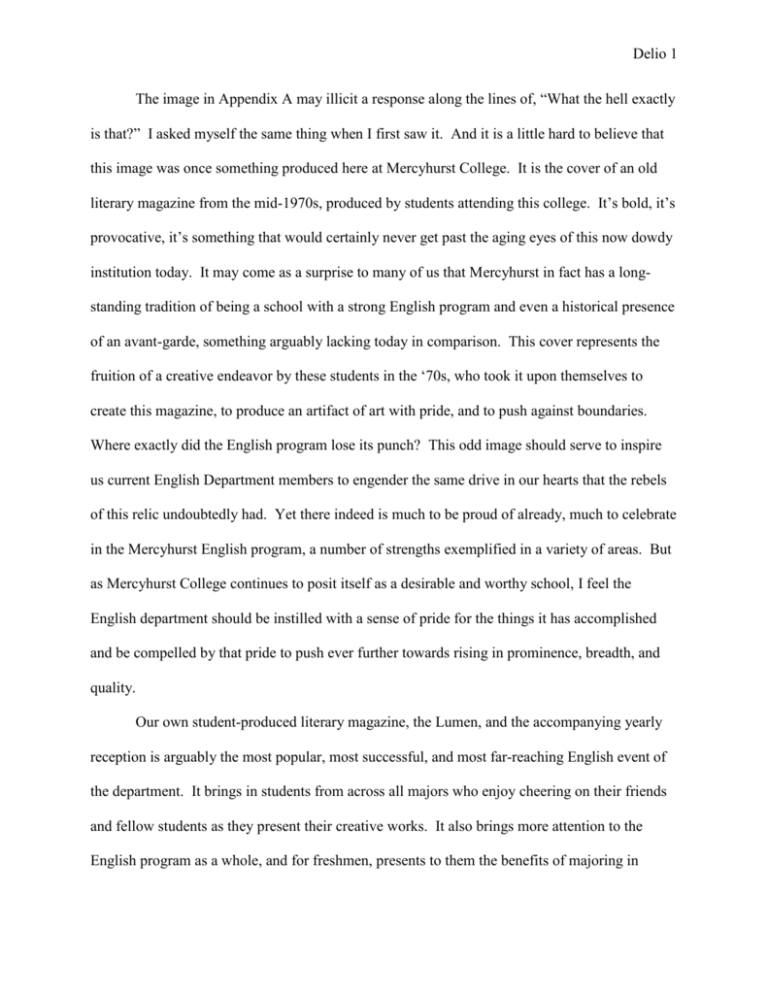
Delio 1 The image in Appendix A may illicit a response along the lines of, “What the hell exactly is that?” I asked myself the same thing when I first saw it. And it is a little hard to believe that this image was once something produced here at Mercyhurst College. It is the cover of an old literary magazine from the mid-1970s, produced by students attending this college. It’s bold, it’s provocative, it’s something that would certainly never get past the aging eyes of this now dowdy institution today. It may come as a surprise to many of us that Mercyhurst in fact has a longstanding tradition of being a school with a strong English program and even a historical presence of an avant-garde, something arguably lacking today in comparison. This cover represents the fruition of a creative endeavor by these students in the ‘70s, who took it upon themselves to create this magazine, to produce an artifact of art with pride, and to push against boundaries. Where exactly did the English program lose its punch? This odd image should serve to inspire us current English Department members to engender the same drive in our hearts that the rebels of this relic undoubtedly had. Yet there indeed is much to be proud of already, much to celebrate in the Mercyhurst English program, a number of strengths exemplified in a variety of areas. But as Mercyhurst College continues to posit itself as a desirable and worthy school, I feel the English department should be instilled with a sense of pride for the things it has accomplished and be compelled by that pride to push ever further towards rising in prominence, breadth, and quality. Our own student-produced literary magazine, the Lumen, and the accompanying yearly reception is arguably the most popular, most successful, and most far-reaching English event of the department. It brings in students from across all majors who enjoy cheering on their friends and fellow students as they present their creative works. It also brings more attention to the English program as a whole, and for freshmen, presents to them the benefits of majoring in Delio 2 English and the fact that an ability to write well is appreciated in any field. This year in particular the freshmen were very impressed by the Lumen reception and the quality of the work that was read. Assistant professor of English, Dr. Brian Reed, received glowing write-ups by the freshmen with sentiments along the lines of, “When I grow up, I want to be just like them!”. This event is very important and something the English department should be especially proud of. It is the most notable opportunity of the year to show off our talents to our peers and fellow students. It is an event that everyone enjoys. Another point of pride is the prestigious institutions graduates of the English program here are being accepted into, among these being University of Texas Fort Worth, Kent State, Boston College, Carnegie Mellon, and the University of Maryland. The benefits and advantages imparted on students of the English program at Mercyhurst, and the skills that are honed here, are being increasingly recognized by graduate schools as more students apply and put themselves out in the field. These past graduates (such as Jason Sepac, Jaime Mahoney, Bethany Shaffer, Patrick Thomas) are opening pathways for current and future students who wish to further their education beyond the halls of Old Main. They are helping to ensure that Mercyhurst College becomes a name that is given more credence by graduate schools in their consideration of applicants. The English Honors Society, Sigma Tau Delta, is another important aspect of the English program at Mercyhurst College. It aligns Mercyhurst with an international organization and yields numerous occasions to put the English program into the spotlight, including national conferences and journals. This year saw a four-fold increase in membership of the Mercyhurst chapter, Beta Upsilon, over last year. By no means am I demeaning the accomplishments of Frank Gehres and Justine Keltz, the sole members of 2007-2008, but I think there are obvious Delio 3 difficulties in operating an organization with only two people, one of whom was in the armpit of Eastern Europe for half of the year, but I digress. Sigma Tau Delta provides students with the fantastic opportunity to become published in the yearly journals and to have their work opened up to a national audience. This year, as opposed to last, a number of students submitted works to be considered for publication, success in which would provide Mercyhurst with great exposure, much in the same way the success of its graduates does. Perhaps, though, what I have found to be the most outstanding feature of the English department is the absolute dedication of the faculty and the open rapport they share with students. As much as I may have been upset over any number of things over the past three years, I always found someone to listen to my petty, pouty rants, regardless of their true desire to do so or not. I always felt as if someone actually genuinely cared about me, cared for my concerns, cared for what I had to say. The professors here have a deep-seated, personal investment in seeing students progress and achieve even beyond their goals that I find inspiring. They push us to always become better, challenge us to step outside of ourselves, and refuse to listen to our poor excuses for not putting forth our best effort. It is in dialogues and open communications based upon these relationships that I believe the seeds of the advancement of the department can take hold and flourish into an exemplar of English excellence. But how exactly are we to go about this advancement? Where do we begin? And how do we establish a goal for the English program? Maybe a good way to better the program can be accomplished, much like when cheating on a test, by looking over the shoulder of your buddies, or even your sworn enemies, and copping some decent answers. By comparing the program at Mercyhurst to those of some institutions of comparable size but more renowned curricula, notably Allegheny, Kenyon, and Oberlin, I believe we can take this college from a C+ to a solid Delio 4 A-. The aforementioned schools are widely regarded among the top small liberal arts schools with outstanding English departments. One of the most compelling elements of these schools is the copious amount of diverse and arresting classes in their catalogs, something that is more or less absent from Mercyhurst’s. In short, there is not much of a “Gee Whiz” factor to the English curriculum here, as in “Gee Whiz! I really want to take that class!” Not much ‘sex appeal,’ if you will. And yes, some of the courses these other schools offer are pretty provocative and even downright sexy, like the midnight hussies working the strip for their Candy Tangerine Man. Some examples of these attractively-titled courses [Appendix B], culled from the various catalogs, are: Modernist Chicago: Urban Literature and Sociology; Modern Fiction and Sexual Difference (oh my, sex right in the title); Theory of Comedy; Film as Text; Hardboiled Crime Fiction and Film Noir; The Jazz Age; and of course Wit, Rakes, Madmen, & Jane: A Survey of Eighteenth-Century Literature. These titles come up against courses more self-evidently named classes from the Mercyhurst catalog: Medieval Literature, Colonial Literature, Late NineteenthCentury American Literature, Early Twentieth-Century American Literature, The English Novel, Women and Literature, and the particularly unsexy, Applied Linguistics. In this regard, Mercyhurst is certainly the Plain Jane to the other schools’ Jazzed-up Jezebel. Moreover, the descriptions of comparable courses across catalogs, taken from their respective online listings, are also more compelling. For instance, Mercyhurst’s American Renaissance course can be likened to Oberlin’s American Literature 1825-65: "To write like an American." The description of the Mercyhurst course reads thusly: Between 1800 and 1865, American literature came of age. A study of such famous writers as Poe, Emerson, Frederick Douglass, Hawthorne, Melville, Delio 5 Thoreau, Whitman, and Dickinson, along with some neglected writers, all of whom found their distinctively American form and substance during this period. Not too bad, I might be interested in that. (Side note: I did in fact take this course.) On the other hand, the class offered at Oberlin has this description: Melville's phrase captures a major concern of American writers during the antebellum period: the creation of a distinctly American literature. Directly or indirectly, many writers of the era engaged with "writing like an American" -Melville, Emerson, Whitman, Douglass, Jacobs among them -- while a few, notably Poe, repudiated the very idea. We'll read works by a variety of writers as we consider what "writing like an American" entailed during this formative era in American culture and history. Clearly these two courses have the same idea in mind as to the focus and characteristics of the period, and there’s not an outstanding difference between them, but the Oberlin class reads a little more eloquently, and is subtly alluring. It’s more nuanced, more gripping, and more likely to generate interest. Granted the description is significantly longer than the one provided by Mercyhurst, but nearly all the course descriptions of the English classes at the abovementioned colleges are longer than Mercyhurst’s. This small amount of extra attention and consideration to detailed course descriptions can go a long way and is reflective of the larger face of the English department. This change may be influential in luring more people into becoming English majors, it may create more enthusiastic attitudes upon entering the class, and it may even garner more attention from prospective students who would otherwise dismiss attending Mercyhurst altogether. Delio 6 Taking a peek at those other institutions, where does that leave us? How then are we here at Mercyhurst College to change the English program? There are many great things already functioning within the department that provides the foundation for excellence. I sincerely believe that Mercyhurst has the potential to hone its English program into a formidable and truly unique entity that becomes a pillar for other programs to look to, and to imitate. Clearly, one of the most wanting changes is in the course selection offered, and the development of more interesting, more challenging, more magnetic classes. This is something well within our grasp as students to alter. There is already a plan for the 2008-2009 school year to begin offering more topics-based courses that delve deeply into concentrated areas of study and present more interesting and out-of-the-ordinary perspectives. These classes include Literature of the Middle East, the popular Counterculture Fiction, and a course on environmental writing and literature. These sorts of initiatives on behalf of the professors are extremely important in developing a more riveting curriculum, and, as students of this school, we have the ability to provide our input upon the sorts of classes that will be taught, classes which can be centered upon our collective interests. The solid professor-student relationship can serve as the basis for the establishment of new classes. The professors are open to our suggestions and simply sitting down and discussing things with them, for instance, let’s say the creation of a course based on Modernist Novels of European Excess: Fiction of Decadence and Decay, making a class of literature about alcohol and promiscuous sex is entirely possible. This is a mutual responsibility that the professors and the students both share. We should be in a constant process of self-evaluation and continually ask ourselves if we are doing the best we possibly can as a department. Of course, there is an inherent impediment structured within the requirements of the Mercyhurst English major and into the deeply regimented core curriculum that hinders the ability Delio 7 of drastic course changes to be easily made. The current English requirements are oppressive to a certain degree, entrenched in survey classes and an abundance of dictated requirements. If we again consult the major requirements of other institutions we will see that they are much freer and more open to the whims and desires of individual students. We must bear in mind, however, that most the aforementioned schools operate on semester systems with courses weighted at four credits. If you will notice in Appendix D, the requirements for program fulfillment are incredibly stricter at Mercyhurst. For an English literature major with no specific concentration, Oberlin sets out a mere seven classes that its students must take. The other 28 credits that can be taken from the English department is a relative free-for-all. The situation at Mercyhurst starkly differs. The English requirements for the major are meticulously planned out for the student, with fourteen required classes totaling 42 credits. Clearly it is structured from the moment a student declares until they’re tossing their cap in the air. The curriculum suffocates the individuality of students and their desires to pursue classes tailored to their distinct interests. The locus of the English program at Mercyhurst seems to be significantly centered upon survey classes, which instill students with broad sweeping knowledge of periods or of cultural areas, but less often go in-depth into intense concentrations in specific areas. Half of the curriculum is spent in the 100 and 200-level courses. This may be largely attributed to the fact that the curriculum is based upon English education majors whom must be prepared to teach almost anything at the high school level. However, I feel the quality and knowledge of Mercyhurst English majors suffers on its behalf. The requirements are in desperate need of being revamped in order to shift the heart of the program onto more deeply-focused courses. Reducing the required load of survey courses and expanding the number of 300-level seminar classes offered would cast the English department in a far more interesting light. The reduction Delio 8 of these requirements would naturally free up professors from having to teach so many survey classes and allow them to pursue more concentrated interests and more exciting classes. Some of the 200-level classes in the course catalog could easily be expanded upon and extrapolated to 300-level seminars, good candidates being Postmodern Literature and Twentieth-Century Poetry. These classes would also have to step further outside the restrictive canon and teach more fringe literature that students may not have been previously exposed to. The classes at Mercyhurst are often very dependent upon canonical works. As senior Jack D. Thearle stated, “I read [T. S. Eliot’s] ‘The Wasteland’ four times in three years.” Not dismissing the importance of “The Wasteland,” but this redundancy is a problem within the program that stems from the concentration on survey classes that highlight the more major, seminal works of a period and do not spend as much time digging into the subaltern. In addition to exacting changes upon the course list, the English department in general needs a big coming-out party, much like a young debutante with a new makeover, through the organization of more activities and events that run throughout the year. The April Literary Festival is a great series of events, but we are in fact here for another seven or eight months, too. The English department needs to put itself out there more. Take a cue from every other department and host some fund raisers that could generate money to be used for more fun and enriching activities. For instance, as Assistant Professor Dr. Christine Riley-Brown has suggested, a Valentine-Gram service where students can send flowers with lines from famous love-poems on them. Possibilities are great and could even extend into a black market paper revision service. (I’m seeing ripe opportunities in the sports-medicine field.) The money from these types of activities could be used to take field trips to see more big-name authors and poets conducting readings at larger institutions. With Cleveland, Buffalo, and Pittsburgh—home to Delio 9 colleges and universities such as Case Western, University of Buffalo, Carnegie Melon, and Pitt—all within the vicinity, it is well within the realm of possibility to take a short road trip and take advantage of our geographic location. Sigma Tau Delta should, likewise, assume a greater role in the general happenings of the English program. It should create a stronger unity amongst English majors of all grades that can operate as a community at Mercyhurst and within the Erie community as well: reaching out to undergraduate majors and presenting the image of role models and sources for advice and gaining a greater presence in the Erie area, perhaps by conducting readings at places such as the Martin Luther King Center with the goal of engendering the spirit of a love of literature in the hearts of underprivileged youth, maybe even inspiring one to become the next great writer. All of these benefits and potential changes cannot come without a certain price, however, and that price is rooted within a firm dedication by the English students to see the department they call home be renovated into an outstanding bastion of brilliance. The burden rests largely upon our shoulders. We are not Oberlin, or Kenyon, nor are we Oberlin or Kenyon students. We are Mercyhurst, and frankly, we can be better than them: less snobby and pretentious, less so predictably “college,” and more authentic English students. We must be committed to putting forth a concerted effort to be more intimately involved with the English department and to devote ourselves to becoming productive generators of class discussion and active participators in outer classroom activities. The excellence of the greater English program is derivative of the excellence within each of us and if we rise to this occasion there is nothing preventing this excellence from being carried out. So here lies the call, the challenge, the opportunity to transform this college into something we can all be proud of, something I personally will not be ashamed to disclose to people I meet in the future, something I deeply feel we are all ready for. Delio 10 As we stand on the edge of another year at Mercyhurst College, another year of English, another year of the same old, I think we need to be shoved out of the repetitious cycle of ‘another’s and into a completely new and wholly other realm. Delio 11 Works Cited and Consulted Course Descriptions. English Dept., Mercyhurst College 6 May 2008 <http://www.mercyhurst.edu/departments/english/course_descriptions.html>. Courses in English. English Dept., Kenyon College 6 May 2008 <http://www.kenyon.edu/ x10223.xml>. English Major Requirements. English Dept., Mercyhurst College 9 May 2008 <http://www.mercyhurst.edu/departments/english/majors_concentrations/ english_major.html>. The English Majors’ Handbook. English Dept., Oberlin College 9 May 2008 <http://www.oberlin.edu/english/department/major.html>. Oberlin Online Course Catalog. Oberlin College 6 May 2008 <http://catalog.oberlin.edu/ content.php?catoid=18&navoid=323>.
